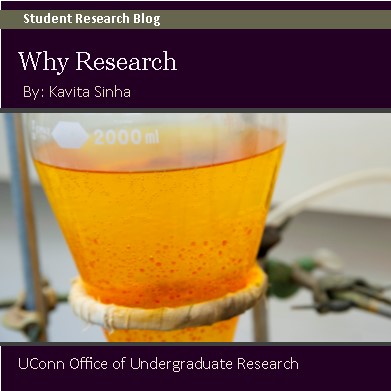 By: Kavita Sinha, OUR Peer Research Ambassador
By: Kavita Sinha, OUR Peer Research Ambassador
Coming into my freshman year of college, research wasn’t even a blip on my radar. I knew that I wanted to attend medical school after I graduated, and research didn’t factor into my thoughts on how I would get there. Even after I watched my friends send email after email to professors, anxiously seeking a lab position, I had no interest in doing the same. It wasn’t until my parents asked that I find something to keep myself occupied over the summer that I started to look into research positions. Now, less than 50 days away from graduation, I am coming up on three years in my lab and am writing an Honors thesis on the work I have completed there. So, for those of you who ask the same “Why Research?” question that I once did, here are some of my answers.
You get to learn outside of the classroom.
Chances are, you’re somewhat interested in the topics covered by your major. Learning in a classroom setting can be rewarding, but what I came to love about research was getting the opportunity to apply what I had learned in class to something real. As a science major, my lab courses taught me the basics of techniques such as Western blotting or flow cytometry. Yet, it wasn’t until I utilized these same methods in my lab that I understood a purpose for them outside of the classroom.Aside from the typical learning opportunities that you would assume to come out of a lab experience, I also learned a lot about what I wanted to do with my future. The principal investigator (PI) of my lab tried to convince me from day 1 that I should pursue an MD/PhD rather than an MD. Though I have come to appreciate research over the past three years, my lab experience has also taught me that it is not the direction I want to take in life. For anyone who is unsure about post-graduate education, getting involved in research may help in making that decision. It is better to get an understanding of what research is like before applying to a PhD program that you might not enjoy.
You get to practice your communication skills.
Anyone you ask will tell you that public speaking is one of my biggest fears. The first presentation that I gave in front of my lab ended with me running out of the room crying. I have since gotten much better at talking to groups of people because of the experiences I have had from being involved in research. When I first started out in my lab, the audiences were small. My friends would ask what my lab was about and what I did there. Though it seems insignificant, learning how to accurately describe my work in terms that someone outside of the field could understand is an important skill. It has taught me how to be concise and thoughtful in my answers, and these experiences were good practice for presenting at research conferences where not everyone may be doing the same work.Research not only improved my verbal communication skills but my written communication skills as well. During my time in the lab, I have had to write multiple proposals, summaries of my semester research progress, and a thesis. Writing in the context of research is completely different than other types of writing you may have to do throughout your college career. Learning how to write in this style made me a better a writer and also made it easier for me to read other writing in that style. This made my life much easier when I had to read articles from scientific journals in some of my upper level classes.
You get to travel.
Doing research abroad or in a different state is a great way to make traveling more affordable in some cases. There are a ton of summer research programs that will provide students with a stipend to come to their facility and work in a lab. I have had friends that I have used such opportunities to travel abroad. They would work in their labs from Monday-Thursday and use the weekends to explore the country. Even as someone who chose to do research close to home, there have been travel opportunities open to me. This past summer, I traveled to the New England Immunology Conference in Woods Hole, Massachusetts to present some of my ongoing research. This gave me the opportunity to meet other professionals in the field and to see what other research topics they were working on.
You get to make connections.
The best part about research, for me, has been being able to meet so many different accomplished and intelligent people. From the graduate students in my lab, to the research assistants, to the faculty at the medical school, I have been fortunate enough to make many connections. These resources have been extremely beneficial in finding out about other opportunities and for having more people to bounce ideas off of. No matter how long someone has worked in a given field, there are things they will not know. Being able to reach out to some of the other people I have met in the past few years has given me a lot of insight toward my own project.
Despite my initial resistance to getting involved with research, the experience has been rewarding in more ways than one. I encourage everyone to give it a chance, because you never know until you try. If you’re interested in getting involved, visit the Office of Undergraduate Research (OUR) website or attend one of the OUR info sessions for information on what your first steps should be. If you have any questions, please feel free to email me at kavita.sinha@uconn.edu.
Kavita Sinha is a senior double majoring in Psychological Sciences and Molecular & Cell Biology. Click here to learn more about Kavita.